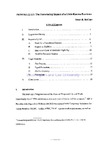PRWORA 115: The Devastating Impact of a Little-Known Provision

View/
Author
McCluer, Stuart H.
Subject
Washington and Lee University, Shepherd Poverty Program
Criminals
Due process of law -- U.S. states
Personal Responsibility and Work Opportunity Reconciliation Act of 1996 (United States)
Ex-convicts -- Legal status, laws, etc.
Recidivism
Metadata
Show full item recordDescription
Stuart H. McCluer is a member of the Class of 2003 of Washington and Lee University School of Law. Capstone; [FULL-TEXT FREELY AVAILABLE ONLINE] Six years ago, Congress enacted the Personal Responsibility and Work Opportunity Act of 1996 and dismantled a sixty-year old social welfare program. Aid to Families with Dependent Children (AFDC) was replaced with Temporary Assistance for Needy Families (TANF). Unlike AFDC, TANF imposes work requirements, as well as strict time limits on recipients. A little-known provision of PRWORA, § 115, contains language that subjects convicted drug felons to a lifetime ban from receiving:
(1) assistance under any State program funded under part A of title IV of the Social Security Act [42 U.S.C.A. § 604 et seq.], or
(2) benefits under the food stamp program (as defined in section 3(h) of the Food Stamp Act of 1977 [7 U.S.C.A. § 2012(h)]) or any State program carried out under the Food Stamp Act of 1977 [7 U.S.C.A. § 2011 et seq.].
No other class of felons is subject to this ban. One could be convicted of murder in the first degree, for example, and upon release could obtain government assistance. . . .
This paper addresses the rationale for § 115 and seeks to understand whether these justifications for the policy have been satisfied in practice. . . . [From Introduction] Stuart H. McCluer